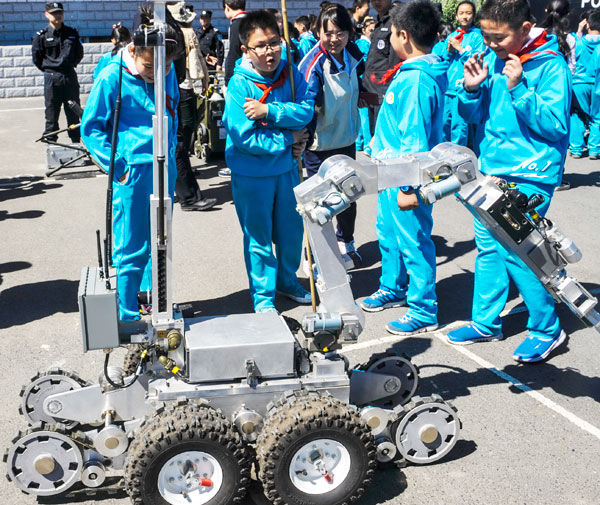'Battle intense and complicated'
Updated: 2013-05-18 01:55
By Cui Jia in Urumqi (China Daily)
|
||||||||
Xinjiang's Party chief discusses plans to deal with separatist violence
 |
|
Primary school pupils look at an anti-terrorist robot at the local police headquarters in Urumqi, the Xinjiang Uygur autonomous region, on Thursday. More than 100 students visited the headquarters to learn about the life and training of police officers. ZHAO GE / XINHUA |
As a region that is constantly battling with separatism, the Xinjiang Uygur autonomous region must plan for the worst while making the best efforts to maintain social stability, a top official of the region said.
Zhang Chunxian, Party chief of Xinjiang, published an article about the region's development over the past three years in Qiushi magazine, which is run by the Central Committee of the Communist Party of China and devoted to policymaking and theoretical studies.
The article ran on May 16, the day before the third anniversary of the central work conference on Xinjiang's development.
"Xinjiang's long-term anti-separatism battle is complicated and intense. We must be innovative in social management to cope with the influences brought by the changes of the anti-terrorism situation in Central Asia and the arrival of social media," he wrote in the article. Zhang added that such influences have been carefully studied.
He said the authorities must be prepared and not panic when dealing with attacks from terrorists and separatists.
"More than 96 percent of violent and terror activities have been curbed during the planning stage and before action," Zhang said.
The region's ability to handle such incidents has significantly improved over the past three years, he said.
Just last month, a terror attack took place in Selibuya township, in southern Xinjiang's Kashgar prefecture. Nine community workers and six policemen (10 Uygurs, three Han and two Mongolians) were killed. Six suspects were shot dead and eight were arrested. The police investigation showed that the group was planning an even bigger attack this summer.
The attack on April 23 was the deadliest incident since the July 5 riot in 2009 in Urumqi, capital of the region, which left about 200 dead.
Police later arrested 11 suspects who had fled the scene. They found 20 explosive devices, raw materials for making explosives, knives, combat training equipment, illegal religious materials as well as three jihadist flags.
The region has also tried to eliminate illegal religious activities and thoughts of extreme religions while protecting people's right of religious freedom.
"The focus is on seizing illegal publications and the distribution of illegal religious information," he said.
Zhang said the key to solving Xinjiang's problem is development, and its priority is to improve people's livelihood. About 70 percent of the region's annual public finance expenditure went to projects to improve people's living standards three years in a row.
During the conference in 2010, the central government put forward Xinjiang's development goals and tasks over the next five to 10 years, providing policy support from the central government and construction project assistance from corresponding provinces and municipalities across the country. The GDP of the region has grown from 427.7 billion yuan ($68.98 billion) in 2009 to 750 billion yuan in 2012.

 Michelle lays roses at site along Berlin Wall
Michelle lays roses at site along Berlin Wall
 Historic space lecture in Tiangong-1 commences
Historic space lecture in Tiangong-1 commences
 'Sopranos' Star James Gandolfini dead at 51
'Sopranos' Star James Gandolfini dead at 51
 UN: Number of refugees hits 18-year high
UN: Number of refugees hits 18-year high
 Slide: Jet exercises from aircraft carrier
Slide: Jet exercises from aircraft carrier
 Talks establish fishery hotline
Talks establish fishery hotline
 Foreign buyers eye Chinese drones
Foreign buyers eye Chinese drones
 UN chief hails China's peacekeepers
UN chief hails China's peacekeepers
Most Viewed
Editor's Picks

|

|

|

|

|

|
Today's Top News
Shenzhou X astronaut gives lecture today
US told to reassess duties on Chinese paper
Chinese seek greater share of satellite market
Russia rejects Obama's nuke cut proposal
US immigration bill sees Senate breakthrough
Brazilian cities revoke fare hikes
Moody's warns on China's local govt debt
Air quality in major cities drops in May
US Weekly

|

|







